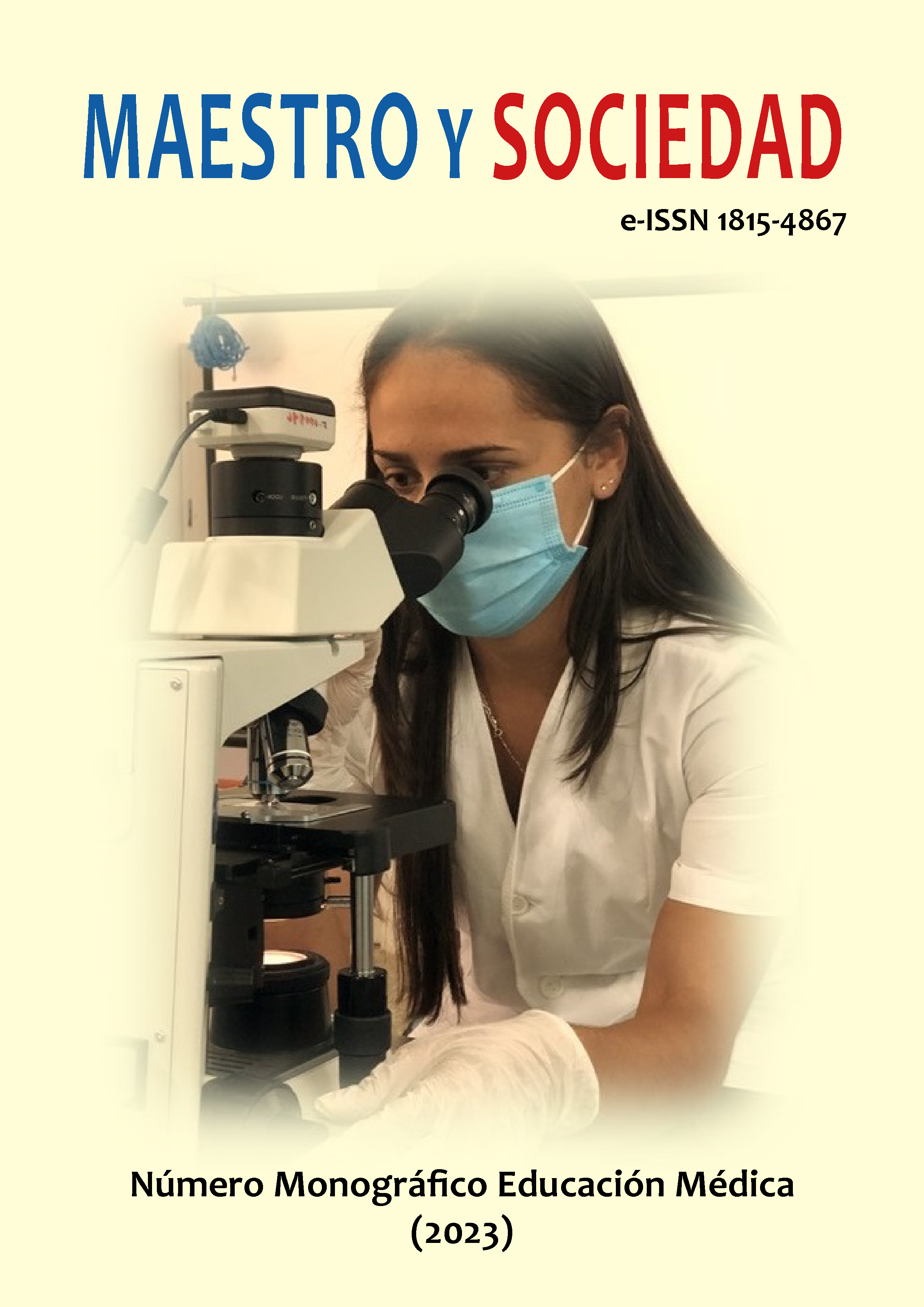Improvement strategy to improve the professional performance of teachers in the nursing career
Improvement strategy to improve the professional performance of teachers in the nursing career
Keywords:
professional improvement, nursing teacher, pedagogical culture, improvement strategyAbstract
Introduction: The need to improve the performance of the Nursing professor, as well as the development of pedagogical
skills to solve the main problems in praxis, has been the subject of numerous investigations whose purpose is to satisfy
social demands in the various scenarios of professional performance. Objective: elaboration of an improvement strategy
for the development of pedagogical culture in the nursing teachers of the medical sciences branch of Palma Soriano
to improve their educational performance. Materials and Methods: Methods of the theoretical and empirical level
were used, such as: synthetic analytical in the characterization of the object, historical-logical, inductive-deductive;
documentary analysis for the study of specialized literature on the subject and interviews with professionals, among
others. Results: Indicator 1.1 referred to the level of pedagogical knowledge shows that 4 (40%) teachers present a high level, at a medium level 6 (60%) teachers and no low level teachers; indicator 2.4 refers to the level of application
of educational methods and procedures, 6 (60%) teachers reach a high level, 3 (30%) medium level teachers and 1
(10%) low level teacher and indicator 2.9 refers to the degree of transformation of the modes of professional action, no
higher degree is observed in 8 (80%) teachers, medium degree is observed in 2 (20%) teachers and low degree in no
teacher. Discussion: As a professional improvement strategy, what was said by Armiñana and Lozada is assumed, who
state that they constitute an objective and contextualized work tool that contains improvement actions for professional
improvement. These solve needs for improvement and respond to the dialectical contradictions that are generated
in the performance of an activity. Conclusions: The professional improvement strategy has a dynamic and staggered
interaction of the actions in each of the stages in correspondence with the characteristics and allowed to consider the
relevance of the use of technologies in the process of professional improvement to enhance and expand the effect and
scope of postgraduate education forms used in order to improve the educational performance of nursing teachers.
References
Armas Ramírez, N. L., Josefa & Perdomo, J. M. (2005). Aproximaciones al estudio de las estrategias como
resultado científico. CECIP. Instituto Superior Pedagógico “Félix Varela”.
Baxter, E. (2002). La formación de valores. Una tarea pedagógica. Ed. Pueblo y Educación.
Cordero, G., Santillán, V., Carrera, S., Corral, E., Fernández, L. A. (2016). Estrategias de ventilación a favor de
la neuroprotección: ¿qué podemos hacer? Perinatol Reprod Humana, 30(3), 130-7. https://www.sciencedirect.com/
science/article/pii/S0187533717300158
García Batista, G., Addine Fernández, F. (2001). Formación Permanente de profesores. Retos del siglo XXI. (Curso
. Congreso Internacional Pedagogía.
Jiménez Puerto, C. L. y Calderón Mora, M. M. (2017). Estrategia de superación profesional para la formación de la
competencia: procesamiento de la información. https://www.eumed.net/rev/atlante/2017/12/superacion-profesional.html
Linares Cordero, M., Cruz Estupiñán, D. (2013). Estrategia de superación pedagógica para docentes de
la carrera de Medicina. Educ Med Super, 27(4). http://scielo.sld.cu/scielo.php?script=sci_arttext&pid=S0864-
&lng=es
López-Espinosa GJ, Quintana-Mugica R, Rodríguez-Cruz O, Gómez-López L, Pérez-de Armas A, Aparicio-Manresa
G. (2014). El profesor principal y su preparación para diseñar instrumentos de evaluación escritos. EDUMECENTRO, 6(2):
[aprox. 14 p.]. http://scielo.sld.cu/scielo.php?script=sci_arttext&pid=S2077-28742014000200007&lng=es
Martínez Isaac, J. A., Mendoza Rodríguez, H., Valcárcel Izquierdo, N. (2013). Diseño curricular del diplomado en
Enfermería clínico-quirúrgica para el sistema de salud cubano. Educ Med Super., 27(1), 64-74. http://scielo.sld.cu/scielo.
php?script=sci_arttext&pid=S0864-21412013000100009
Medina González, I., Valcárcel Izquierdo, N. (2016). Superación profesional del licenciado en Enfermería para la
solución de problemas en su desempeño profesional pedagógico. Educ Med Super, 30(1). http://www.ems.sld.cu/index.
php/ems/article/view/720/331
Vialart Vidal, N., Medina González, I., & Gavilondo Mariño, X. (2018). La cultura profesional del docente de
enfermería: Preparación ante las tecnologías informáticas. Revista Cubana de Enfermería, 34(2). https://revenfermeria.
sld.cu/index.php/enf/article/view/1556/359
Published
How to Cite
Issue
Section
License
Copyright (c) 2023 Onnis del Río Pérez, Alicia Susana Tamayo del Río

This work is licensed under a Creative Commons Attribution-NonCommercial-NoDerivatives 4.0 International License.
This journal provides immediate open access to its content, based on the principle that offering the public free access to research helps a greater global exchange of knowledge. Each author is responsible for the content of each of their articles.



























 Universidad de Oriente
Universidad de Oriente 